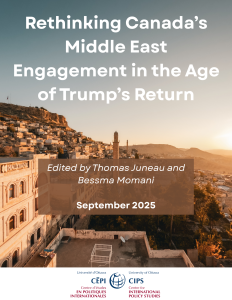- Home
- Rethinking Canada’s Middle East Engagement in the Age of Trump’s Return
Rethinking Canada’s Middle East Engagement in the Age of Trump’s Return
![]() Full text (pdf)
Full text (pdf)
Edited by Thomas Juneau and Bessma Momani
CIPS Policy Report, September 2025
In 2022, we published a co-edited volume on Canada’s foreign and defence policies toward the Middle East (Juneau and Momani 2022), the first book on this topic in fifteen years. One of the key themes throughout the book was how, largely as a result of its sheltered geographic position in North America, Canada’s interests in the Middle East have been limited and mostly discretionary. When, for example, Ottawa decides on its participation in multinational coalitions intervening militarily in the region – as in Iraq in 2003, in Libya in 2011, or against the Islamic State after 2014 – the criteria that guided its decisions were not an immediate threat to its security. Rather, Canada has long been able to afford the luxury of being guided by a combination of other diplomatic priorities (especially managing its most important diplomatic relationship with the United States), domestic political considerations, as well as the ideology of the prime minister and party in power at the time.
Since the publication of the 2022 book, much has changed in the Middle East. The balance of regional power has been upended in the wake of Hamas’ attack on Israel on 7 October 2023 and of the wars that have followed. The Islamic Republic of Iran has been weakened and its only state ally, the Assad regime in Syria, has collapsed, while two of its main non-state partners, both Hamas in Gaza and Hezbollah in Lebanon, have been severely weakened. A resolution to the Israeli-Palestinian conflict appears as distant as before. Perhaps most importantly for Canada, the return of Donald Trump in January 2025 to the presidency in the United States has forced a rethink of Canada’s foreign, defence, trade, and security policies.
To take stock of what these seismic changes mean for Canada, we organized a workshop on 14 May 2025 on Canada and the Middle East at the University of Ottawa, hosted by the Centre for International Policy Studies (CIPS). The workshop featured speakers including the seven authors in this special section as well as several other experts from the United States, Europe, and the Middle East and was funded by a Targeted Engagement Grant from the Department of National Defence’s Mobilizing Insights in National Defence and Security (MINDS). The invitation-only event brought together dozens of graduate students, academics, retired practitioners, as well as civilian and military officials from throughout the Canadian government. It offered participants the opportunity to hold frank and off-the-record discussions on the future of Canadian engagement in the Middle East.
Table of Contents
- Introduction – Thomas Juneau and Bessma Momani
- Toward a Viable Israel/Palestine Peace: Challenges and Opportunities for Canada – Tahani Mustafa
- Iron Walls and Open Wounds: Canada’s Role in Preserving Israel’s Path to Peace – Michael Horowitz
- Canada and a Confederal Approach to Israel-Palestine – Mira Sucharov
- Pursuing the Negotiated Departure of Hamas from Gaza – Daniel B. Shapiro
- Challenges and Opportunities for Promoting Stability in Lebanon – Randa Slim
- Canada Is Part of the Solution in Syria – Kareem Shaheen
- Between Rockets and Ballots: How Iraqi Militias Are Recalibrating to Secure Their Future – Hamdi Malik
Editors
 Thomas Juneau is a Professor at the University of Ottawa, a non-resident fellow with the Sana’a Center for Strategic Studies, and an associate fellow with Chatham House.
Thomas Juneau is a Professor at the University of Ottawa, a non-resident fellow with the Sana’a Center for Strategic Studies, and an associate fellow with Chatham House.
 Bessma Momani is Professor and Associate Vice-President, International at the University of Waterloo and Senior Fellow at the Centre for International Governance Innovation (CIGI).
Bessma Momani is Professor and Associate Vice-President, International at the University of Waterloo and Senior Fellow at the Centre for International Governance Innovation (CIGI).


